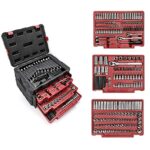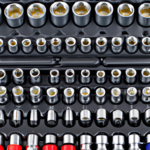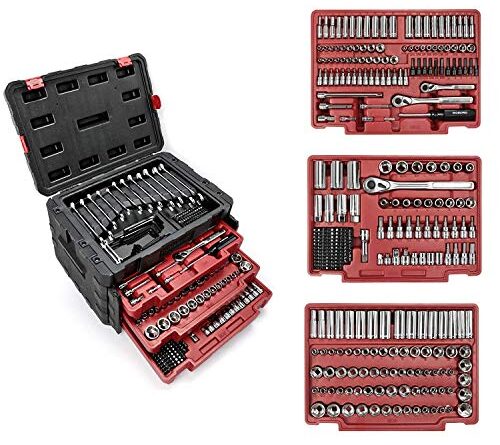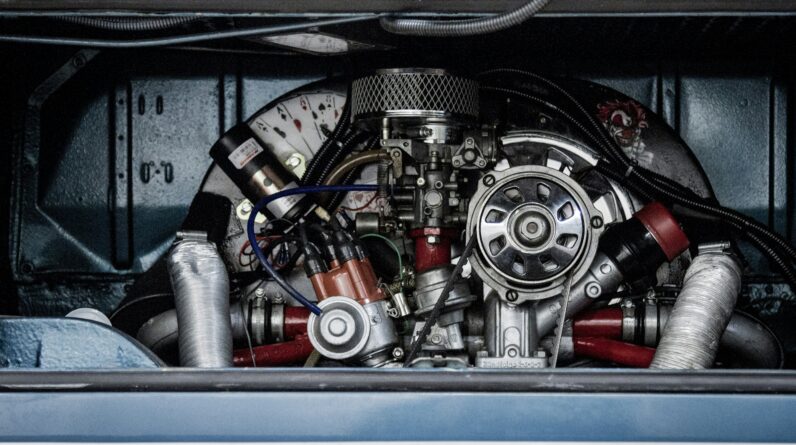
Disclaimer: This post may contain affiliate links. As an Amazon Associate, we earn from qualifying purchases.
Have you ever wondered what makes a socket wrench so sturdy and durable? In the world of tools, the question of the strongest socket material has always been a subject of debate. From the common steel to advanced alloys, different materials have been used to create sockets that can withstand high torque forces.
In this post, we will explore the various socket materials and delve into their strengths and weaknesses, helping you choose the best one for your toolset. So, whether you are a DIY enthusiast or a professional mechanic, get ready to discover the secrets behind the strongest socket material.
Introduction
In the world of hardware and tools, sockets play a vital role. Whether you’re a professional mechanic or an avid DIY enthusiast, having a strong and reliable socket is essential for any job. But with so many socket materials available on the market, it can be overwhelming to choose the right one for your needs. We will take a comprehensive look at the different socket materials, their properties, advantages, and disadvantages, to help you make an informed decision.
Overview of Socket Materials
Socket materials vary greatly, ranging from traditional steel to more unconventional options like plastic and ceramic. Each material possesses unique properties and characteristics that influence its strength and durability.
Understanding these properties is crucial in selecting a socket that will withstand the demands of your specific applications.
Properties of Socket Materials
When evaluating socket materials, several key properties come into play. These include strength, hardness, corrosion resistance, conductivity, and weight. The stronger the socket material, the better it can withstand force and torque without deforming or breaking.
Hardness determines the ability of the socket to resist wear and fatigue. Corrosion resistance ensures that the socket remains in good condition even in harsh environments. Conductivity is crucial for electrical applications, while weight affects portability and ease of use.
Factors Influencing Socket Material Strength
The strength of a socket material is influenced by various factors. The composition and processing of the material, as well as any additional heat treatment or coating, can significantly impact its tensile strength, hardness, and toughness. Additionally, the design and manufacturing quality of the socket itself play a crucial role in its overall strength.
Steel Sockets
Steel sockets are widely regarded as one of the most popular and durable options on the market. They are known for their exceptional strength, hardness, and resistance to wear and corrosion. Steel sockets are available in various types, including carbon steel, chrome-molybdenum steel, and impact-grade steel.
Properties of Steel Sockets
Steel sockets exhibit high tensile strength, allowing them to withstand heavy loads and high torque without deformation or breakage. They also possess excellent hardness properties, ensuring durability and resistance to wear over prolonged use. Additionally, steel sockets are highly resistant to corrosion, making them suitable for use in demanding environments.
Types of Steel Sockets
Carbon steel sockets are the most common type and are suitable for general applications. Chrome-molybdenum steel sockets are alloyed with chromium and molybdenum to enhance their strength and durability.
Impact-grade steel sockets, on the other hand, are specially designed to withstand high impact forces, making them ideal for use with pneumatic tools.
Advantages of Steel Sockets
The main advantage of steel sockets is their exceptional strength and durability. They can handle heavy loads, high torque, and harsh working conditions, making them suitable for demanding applications. Steel sockets are also widely available and relatively affordable, making them a cost-effective choice for many users.
Disadvantages of Steel Sockets
One of the drawbacks of steel sockets is their weight. Steel is a dense material, which can make the sockets heavy and cumbersome to use, especially for longer periods or in tight spaces. Additionally, while steel sockets are corrosion-resistant, they are not entirely immune to rust and may require periodic maintenance to ensure longevity.
Titanium Sockets
Titanium sockets are gaining popularity in various industries due to their exceptional strength-to-weight ratio and corrosion resistance. Although titanium is a relatively expensive material, it offers unique advantages that make it suitable for specific applications.
Properties of Titanium Sockets
Titanium sockets are renowned for their exceptional strength, comparable to steel, yet significantly lighter in weight. This lightweight characteristic makes titanium sockets ideal for applications where weight reduction is critical, such as aerospace and automotive industries. Furthermore, titanium exhibits exceptional corrosion resistance, even in highly corrosive environments.
Advantages of Titanium Sockets
The main advantage of titanium sockets is their impressive strength-to-weight ratio. This makes them highly desirable in situations where reducing weight is crucial, without compromising on strength and performance. Titanium sockets are also highly resistant to corrosion, ensuring their longevity even in challenging conditions.
Disadvantages of Titanium Sockets
Despite their impressive properties, titanium sockets also have a few disadvantages. First and foremost, titanium is an expensive material, making these sockets pricier compared to other options. Additionally, titanium is not as readily available as steel, which may limit the options for purchasing these sockets. Finally, titanium is not as hard as steel, which means it may wear down faster under heavy use.
Aluminum Sockets
Aluminum sockets are a lightweight alternative to traditional steel sockets. They are widely used in industries where weight reduction is critical, such as aviation, automotive, and bicycle manufacturing. While aluminum sockets have their advantages, they also come with some limitations to consider.
Properties of Aluminum Sockets
Aluminum sockets are known for their lightweight nature, making them easy to handle and transport. They offer good corrosion resistance, making them suitable for outdoor applications. Additionally, aluminum sockets have excellent thermal conductivity, allowing them to dissipate heat more effectively than other materials.
Advantages of Aluminum Sockets
The primary advantage of aluminum sockets is their lightweight construction. This makes them ideal for applications where reducing weight is essential, such as situations where any excess weight can affect performance or efficiency. Aluminum sockets also offer good corrosion resistance, ensuring durability even in outdoor or humid environments.
Disadvantages of Aluminum Sockets
One of the main disadvantages of aluminum sockets is their lower strength compared to steel or titanium. They are more prone to deformation under heavy loads or high torques, which may limit their use in certain applications. Aluminum sockets also have lower hardness, making them more susceptible to wear and scratching. Additionally, aluminum is a relatively soft material, which can compromise the overall longevity and durability of the sockets.
Copper Sockets
Copper sockets are often preferred in electrical applications due to their excellent conductivity properties. Copper is one of the best conductors of electricity, making it an ideal choice for situations requiring optimal electrical transmission.
Properties of Copper Sockets
Copper sockets offer unparalleled electrical conductivity, ensuring minimal resistance and heat generation during electrical applications. They also exhibit good corrosion resistance, making them suitable for outdoor use. Furthermore, copper sockets have excellent ductility, allowing for easy forming and maneuverability.
Advantages of Copper Sockets
The primary advantage of copper sockets lies in their exceptional electrical conductivity. They ensure efficient electrical transmission with minimal power loss, making them ideal for high-performance electrical applications. Copper sockets are also highly resistant to corrosion, ensuring long-term reliability.
Disadvantages of Copper Sockets
One drawback of copper sockets is their lower mechanical strength compared to steel or titanium. Copper is a relatively soft material, making it more prone to deformation and wear. This limits their use in heavy-duty applications that involve high torque or force. Additionally, copper is a more expensive material compared to steel or aluminum, which may impact their cost.
Brass Sockets
Brass sockets are commonly used in plumbing and various low-strength applications. Brass is an alloy composed of copper and zinc, offering unique properties that make it suitable for specific scenarios.
Properties of Brass Sockets
Brass sockets possess good corrosion resistance and excellent machinability. They offer adequate strength for low-strength applications and are relatively easier to mold and shape compared to other materials. Furthermore, brass sockets exhibit good electrical conductivity, although not as high as copper.
Advantages of Brass Sockets
One advantage of brass sockets is their corrosion resistance, ensuring longevity and durability in plumbing applications or outdoor use. Brass sockets are also relatively affordable compared to options like titanium or copper. Additionally, their machinability allows for easier customization and adjustment to specific needs.
Disadvantages of Brass Sockets
One of the drawbacks of brass sockets is their lower strength compared to steel or titanium options. They are more suitable for low-strength applications and may not hold up well under heavy loads or high torques. Brass is also not as electrically conductive as copper, which may limit its use in certain electrical applications.
Plastic Sockets
Plastic sockets offer a unique alternative to traditional metal sockets. They are lightweight, affordable, and often chosen for applications where non-conductive or non-marring properties are required.
Properties of Plastic Sockets
Plastic sockets are lightweight and offer excellent corrosion resistance. They are also non-conductive, making them ideal for electrical applications where contact with live wires may occur. Additionally, plastic sockets have low friction properties, preventing damage to delicate surfaces.
Advantages of Plastic Sockets
The main advantage of plastic sockets is their affordability and lightweight nature. They are often more affordable compared to metal options, making them accessible to a wider range of users. Plastic sockets are also non-conductive, providing safety in electrical applications. Moreover, their low friction characteristics make them suitable for use on surfaces that need protection.
Disadvantages of Plastic Sockets
One of the main disadvantages of plastic sockets is their overall strength and durability. While they are suitable for light-duty applications, plastic sockets may not withstand heavy loads or high torques. They are more susceptible to wear and deformation compared to metal sockets. Plastic sockets may also have limitations in terms of temperature resistance, as extremely high or low temperatures can affect their performance.
Ceramic Sockets
Ceramic sockets are a unique option in the realm of socket materials. While unconventional, they offer certain advantages that make them suitable for specialized applications.
Properties of Ceramic Sockets
Ceramic sockets offer exceptional heat resistance, making them ideal for high-temperature applications. They are also highly resistant to wear, corrosion, and chemical damage. Ceramic sockets possess excellent insulation properties, ensuring electrical safety in high-voltage applications.
Advantages of Ceramic Sockets
The primary advantage of ceramic sockets is their exceptional heat resistance. They can withstand extremely high temperatures without deforming or losing strength, making them ideal for applications in industries such as glass manufacturing or foundries. Ceramic sockets also offer excellent electrical insulation properties, ensuring safety in high-voltage environments.
Disadvantages of Ceramic Sockets
One significant disadvantage of ceramic sockets is their brittleness. Ceramic is a fragile material and may crack or break under impact or sudden force. This limits their use in applications that involve heavy loads or high impact forces. Ceramic sockets are also more expensive compared to other options, which may restrict their availability for some users.
Conclusion
Choosing the right socket material is crucial for ensuring the reliability, durability, and safety of your tools and equipment. Different socket materials possess unique properties, advantages, and disadvantages that need to be considered based on your specific needs and applications. Steel sockets offer exceptional strength and durability, while titanium sockets excel in providing strength with reduced weight.
Aluminum sockets offer a lightweight alternative, perfect for weight-sensitive industries.
Copper sockets shine in electrical applications with their excellent conductivity. Brass sockets provide affordability and good corrosion resistance for low-strength applications. Plastic sockets offer affordability, non-conductivity, and low friction properties.
Ceramic sockets stand out with exceptional heat resistance and electrical insulation. By understanding the properties and characteristics of each socket material, you can make an informed decision and choose the strongest socket material that best suits your requirements.


















